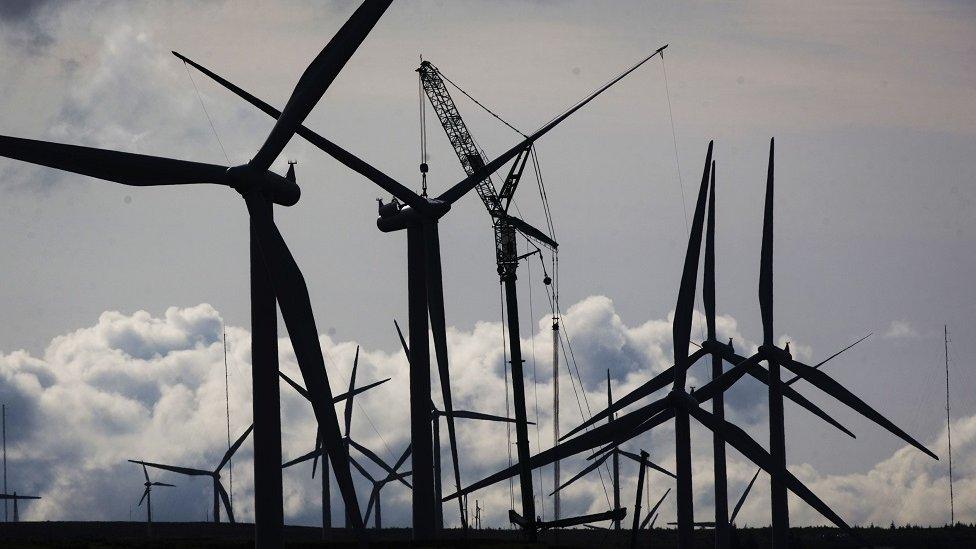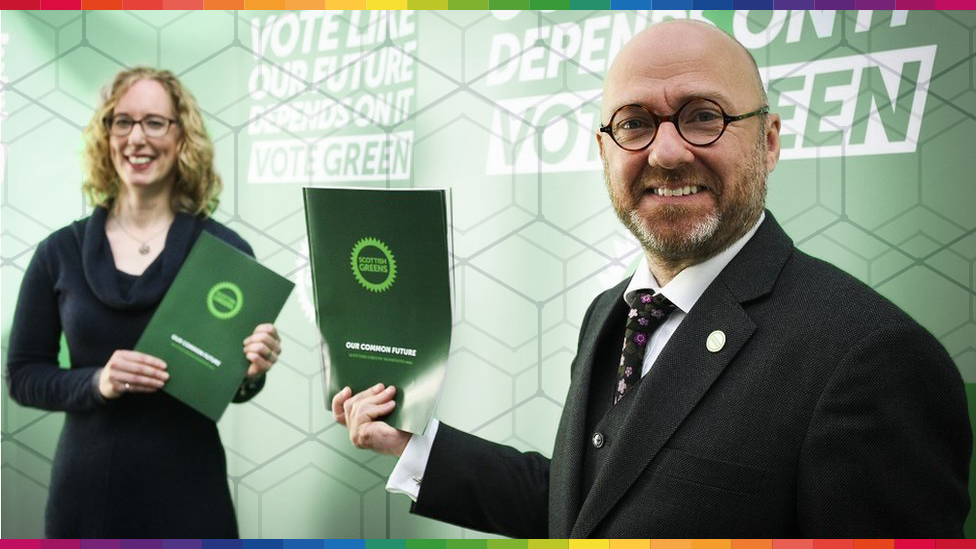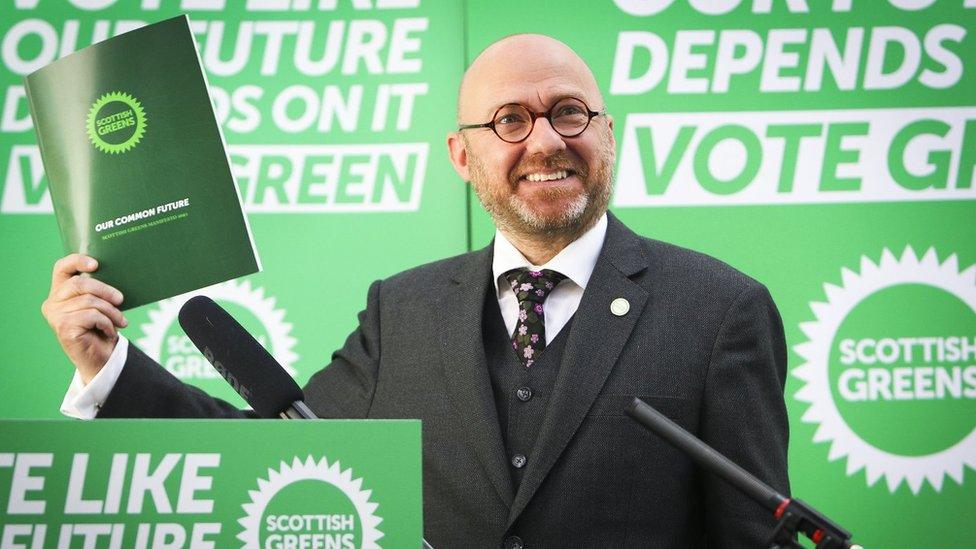Scottish election 2021: Greens pledge 'transformation' of economy
- Published
Scottish election 2021: Greens pledge 'transformation' of economy
The Scottish Greens have set out plans for a "green economic recovery" from the Covid-19 pandemic which they say could create more than 100,000 jobs.
In its Holyrood election manifesto, the party calls for a "fundamental transformation of our economy and society" to tackle climate change.
This would include £7.5bn of investment in public transport and renewables.
The Greens also want a new independence vote during the next five-year Holyrood session if a majority backs it.
Co-leaders Patrick Harvie and Lorna Slater said they "make no apologies" for radical plans which would "ask the richest in society to pay more" and see borrowing increase.
They said "change is essential" if Scotland is to tackle the challenges ahead - of rebuilding the economy, tackling the climate emergency and "correcting the stark and growing inequalities that take away the life chances of too many".

SCOTLAND ALERTS: Get extra updates on BBC election coverage

The Greens - who are hoping to improve on the six seats they won at Holyrood in 2016 - have put economic recovery at the heart of their manifesto, calling for "determined and bold action from the Scottish government, now".
The party has proposed an infrastructure investment plan over the course of the next parliamentary term which would include;
£3.2bn for public transport
£3bn for reducing carbon emissions from homes
£450m for renewable energy projects
and £895m to restore the nature environment.
The manifesto says these projects could "create over 100,000 green jobs", as well as promising a "new deal for workers" with an increased minimum wage and a "transition to a four-day week with no loss of pay".
In order to fund these plans, the party proposes "fundamental reform" of the tax system, informed by a citizens' assembly.
This would include an annual "wealth tax" for millionaires, the replacement of the council tax system with a residential property tax, and a one-off "windfall tax" on larger firms which made "extraordinary profits" during the pandemic.

SCOTLAND'S ELECTION: THE BASICS
What's happening? On 6 May, people across Scotland will vote to elect 129 Members of the Scottish Parliament (MSPs). The party that wins the most seats will form the government. Find out more here.
What powers do they have? MSPs pass laws on aspects of life in Scotland such as health, education and transport - and have some powers over tax and welfare benefits.
Who can vote? Anyone who lives in Scotland, is registered to vote and aged 16 or over on 6 May is eligible. You can register to vote online, external.

The Greens are also calling for an expansion of renewable energy, with 200 new wind turbines to be built every year for a decade, doubling the size of the industry.
They also want to expand tidal energy systems while phasing out North Sea oil and gas production, halting the issuing of new licences for exploration and development and ending subsidies and tax breaks for the industry.
The party also proposes:
the recruitment of 5,500 additional teachers
cheaper public transport, with long-term investment in the rail network
a "frequent flyer levy" on international travel
rent controls and a new regulator for the private rented sector
at least two new national parks and a new ranger service
50,000 hectares of new publicly-owned woodland
closing loopholes in the foxhunting ban and and end to driven grouse shooting
The Greens support Scottish independence, and want to see a referendum held during the next Holyrood session if there is a "simple majority" of MSPs in favour of one.
The party said independence "is now our route back to EU membership" and would give Scotland "the powers and potential to be a leader in the transition to a zero-carbon economy".


The Scottish Greens have set out what they describe as a "comprehensive programme for government".
As a party, they have never been in government at Holyrood but have persuaded the SNP to back policies like free bus travel for young people in exchange for budget support.
At this election, they hope to increase their total of six MSPs but not by so much that they sweep to power.
Co-leader Patrick Harvie said his party does "aspire" to a role in government. It has not ruled out working with the SNP - perhaps even in coalition - if Nicola Sturgeon does not win an overall majority.
Both parties want another independence referendum but they may find it much harder to agree over Green plans to end oil and gas production and introduce a range of new taxes.

Launching the manifesto, Ms Slater said her party would reverse the "inaction or even disinterest" of governments in tackling the climate emergency.
She said the Greens would push for the development of a "world leading renewables industry" and would "not duck the tough decisions when it comes to fossil fuels".
Mr Harvie added that the economy was "already sick" before the pandemic hit, saying the Green platform was a "bold and ambitious plan to build a better and greener future for us all".
And he said independence would allow Scots to build a "fairer, better society" which would push towards a zero-carbon economy and "play a positive role as part of the global community".
The SNP also want to hold a fresh vote on independence in the next Holyrood session, with First Minister Nicola Sturgeon saying Scots should have a choice over what kind of country they want to build post-pandemic.
However the UK government has repeatedly refused to give its backing to such a move, with Prime Minister Boris Johnson insisting that the vote held in 2014 settled the matter for a generation.
The Conservatives, Labour and Lib Dems all argue that the focus of the next parliament should be entirely on recovery from the Covid-19 crisis, and oppose having another referendum.
Lib Dem campaign chairman and MP Alastair Carmichael said: "People who are concerned about the climate emergency will be shocked to see that the Scottish Green party's priority is independence."
Scottish Conservative leader Douglas Ross said the Greens' "hard-left, pie in the sky policies are irresponsible, unrealistic and unsustainable", accusing the party of "economic illiteracy".
Meanwhile Labour's deputy leader Jackie Baillie said her party was ready to work with the Greens to tackle the climate emergency - but said "any commitments for more progressive moves ring hollow when they've chosen to side with the SNP rather than have real change".

POLICIES: Who should I vote for?
CANDIDATES: Who can I vote for in my area?
PODLITICAL: Updates from the campaign

- Published14 April 2021

- Published14 April 2021

- Published14 April 2021
